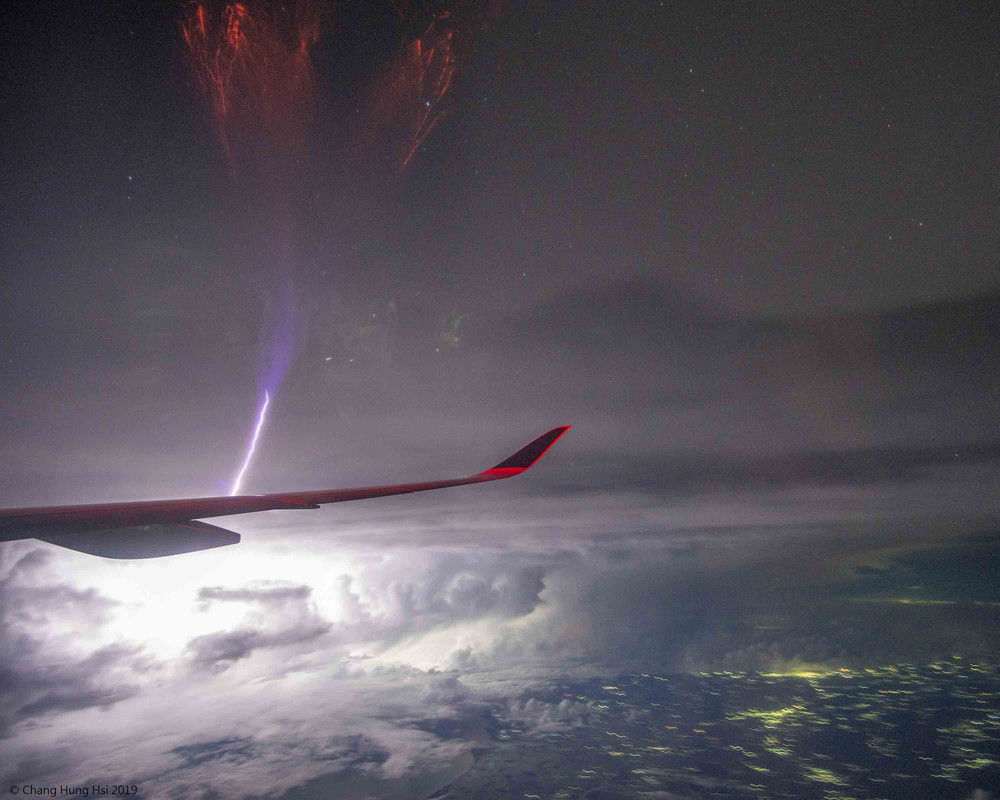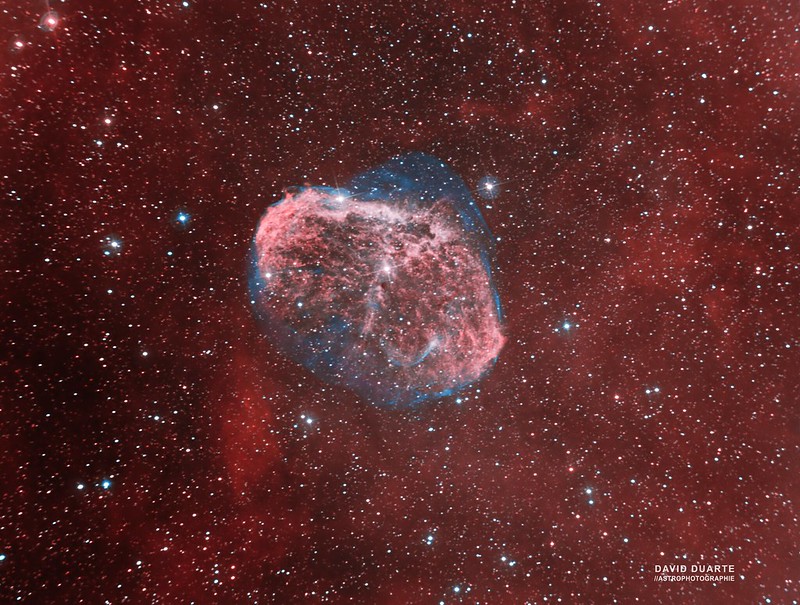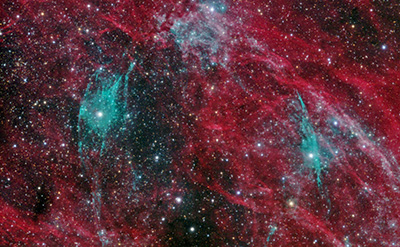Page 2 of 4
Re: Submissions: 2019 September
Posted: Sat Sep 07, 2019 9:42 am
by Caroline Berger
Ic5070 pelican nebula and multiple HH objects, in SHO
Ha 6h, oiii 2h30, sii 2h40
Shot 1+4 september from my garden under a Bortle 6 sky.
Post processed PS cc
https://image.noelshack.com/fichiers/20 ... ccfins.jpg
Full resolution and technical details:
https://www.astrobin.com/nkc917/?nc=user
Re: Submissions: 2019 September
Posted: Sat Sep 07, 2019 2:58 pm
by ilvacca
RUNNING MOON
DESCRIPTION
27,32 days. This is the time that, at a speed of 3.683 km/h, our moon uses to complete the orbit of 2,200,000 km around the earth. A telescope pointed on our satellite for 1 hour and 30 minutes and 100 shots to capture the lunar movement compared to the stars of the Milky Way in the background. Now at the last quarter, the Moon shows both the dazzling scythe that we are used to see, both the temporary 'dark side' visible thanks to the long exposure.
TECHNICAL DATA
Date: August 26 2019
Time: 2:00 am
Location: Cefalù, Sicily, Italy
Camera: Canon EOS 5DIV (unmodded)
Mount: Skywatcher HEQ5
Shot: ISO1600, f6, 4s, no filters.
Optics: TS APO 80/480
www.alessiovaccarophoto.com
Copyright: Alessio Vaccaro
https://www.alessiovaccarophoto.com/img ... xp-low.jpg
Re: Submissions: 2019 September
Posted: Sat Sep 07, 2019 7:06 pm
by jose
http://halfa.webcindario.com/M8-HOSH25.jpg
Hola a todos os dejo esta nebulosa, M 8, espero que os guste;
estos son los datos:
M 8
TOMAS:
Ha: 10 Light de 900 segundos, 10 Darks, 26 Flats y 40 Bias
OIII: 15 Light de 900 segundos, 15 Darks, 26 Flats y 40 Bias
SII: 16 Light de 900 segundos, 16 Darks, 26 Flats y 40 Bias
que hacen un total de 13 horas y media.
TEMPERATURA: -10 GRADOS
TUBO: FSQ 106 ED
CCD: SBIG ST-8300M
MONTURA: CGEM
CCD guiar: QHY5 II
LUGAR: LAS INVIERNAS (GUADALAJARA).
jose
Re: Submissions: 2019 September
Posted: Sat Sep 07, 2019 7:15 pm
by jose
http://astronomiargb.webcindario.com/M13-RGBLcen.jpg
Hola a todos os dejo el cumulo globular M13, espero que os guste;
estos son los datos:
TOMAS:
R: 15 Light de 50 segundos, 15 Darks, 25 Flats y 40 Bias
G: 15 Light de 50 segundos, 15 Darks, 25 Flats y 40 Bias
B: 15 Light de 50 segundos, 15 Darks, 25 Flats y 40 Bias
L: 15 Light de 50 segundos, 15 Darks, 25 Flats y 40 Bias
TEMPERATURA: -10 GRADOS
TUBO: FSQ 106 ED
CCD: SBIG ST-8300M
MONTURA: CGEM
CCD guiar: QHY5 II
LUGAR: LAS INVIERNAS (GUADALAJARA)
saludos
jose
Re: Submissions: 2019 September
Posted: Sun Sep 08, 2019 1:03 pm
by erig25
Gigantic Jet
Copyright:Chang Hung-Hsi
Re: Submissions: 2019 September
Posted: Sun Sep 08, 2019 4:35 pm
by B_Delsaert
Hello,
Here are two of my lastest results:
The Gecko Nebula - a 2-panel mosaic of LBN 437
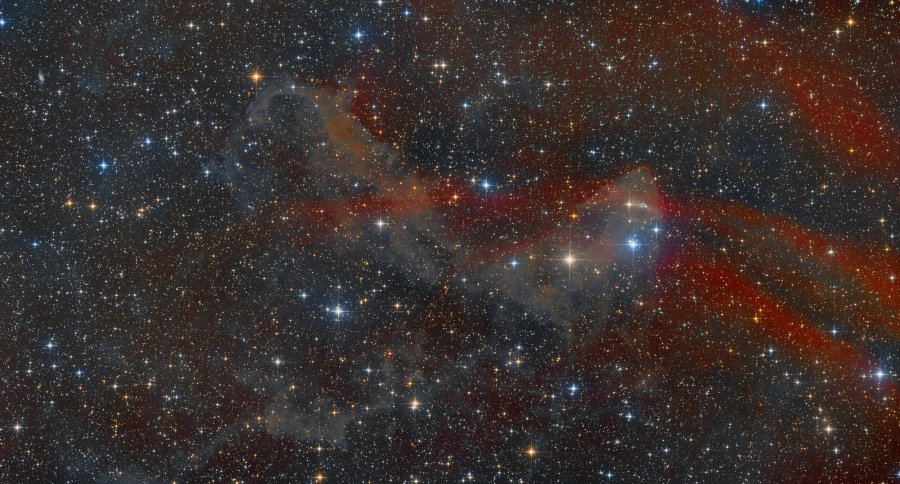
Link to the full res picture:
http://delsaert.files.wordpress.com/201 ... lhargb.jpg
Acquisition details:
http://delsaert.com/2019/08/31/lbn-437- ... ko-nebula/
The Helping Hand or the Cosmic Hand
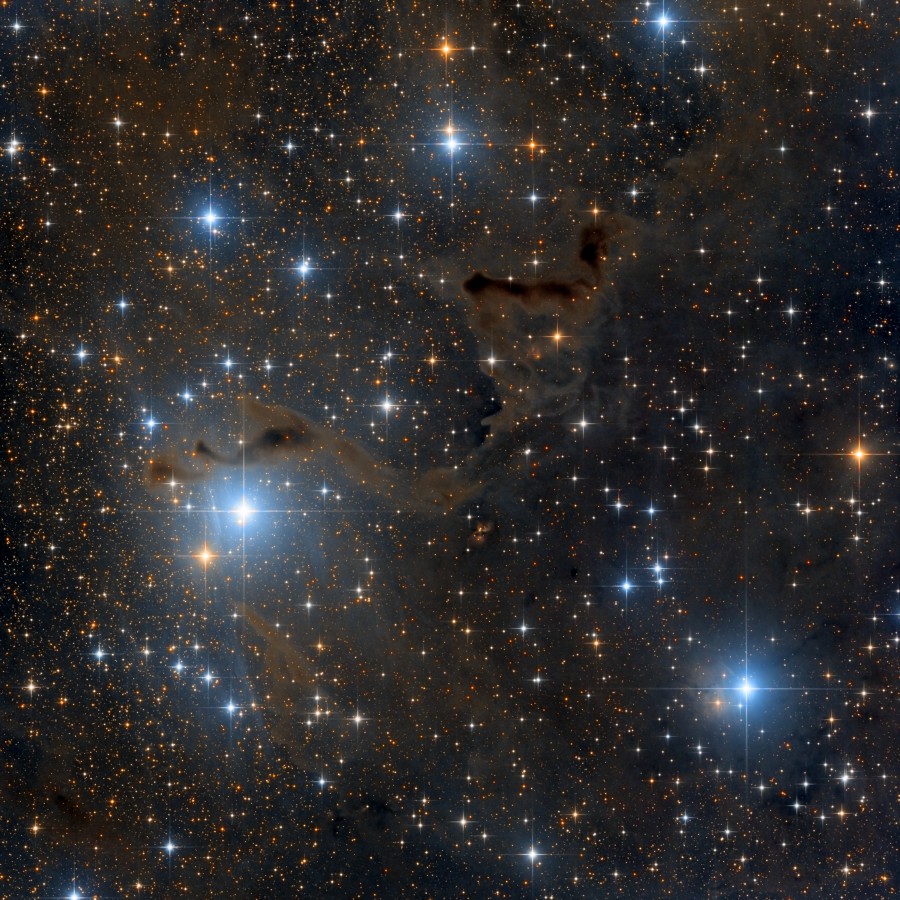
Link to the full res picture:
http://delsaert.files.wordpress.com/201 ... lrgb-3.jpg
Acquisition details:
http://delsaert.com/2019/09/06/the-cosmic-hand/
Thanks for watching!
Bart Delsaert
http://delsaert.com/
Re: Submissions: 2019 September
Posted: Sun Sep 08, 2019 5:43 pm
by dvd007
Re: Submissions: 2019 September
Posted: Sun Sep 08, 2019 6:03 pm
by vvars
Galactic region in Sagittarius, through a DSLR with a 40mm lens. Multiple exposures allowing revealing nebulas and clusters like the Lagoon and Swan nebulas.
 Galactic center low
Galactic center low by
Vasileios Varsamis
For full resolution click here:
Galactic region in Sagittarius
Re: Submissions: 2019 September
Posted: Sun Sep 08, 2019 7:37 pm
by Amarante
'Eagle reflection in HESS II'
Copyright: Sabine Gloaguen
Image dated July 2019 (Namibia)

Click here for a better quality image:
https://photos.smugmug.com/photos/i-PRr ... Rrv6X8.jpg
Re: Submissions: 2019 September
Posted: Sun Sep 08, 2019 10:13 pm
by ZeSly
IC 1396 and the Elephant’s Trunk Nebula
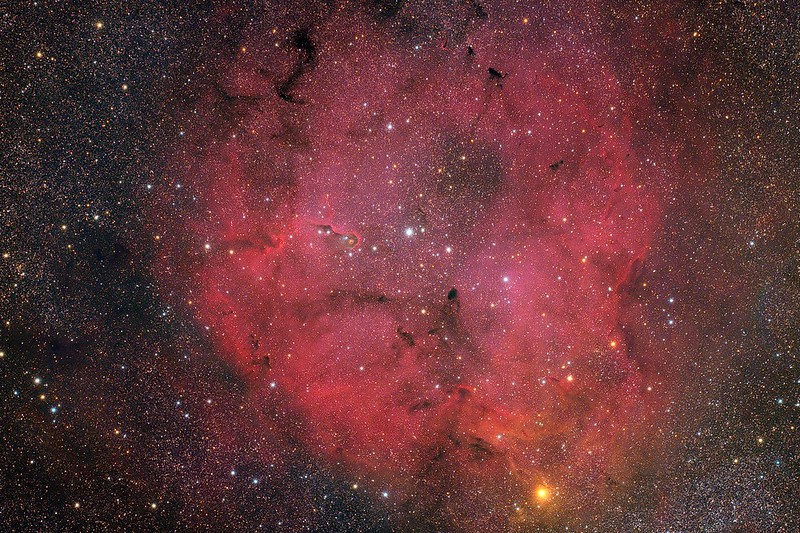 IC 1396 - Elephant's Trunk Nebula
IC 1396 - Elephant's Trunk Nebula by
Sylvain Girard, sur Flickr
https://www.zesly.net/ic-1396-et-la-neb ... delephant/
80 exposures of 1 minute
Camera : Nikon Z6 partially unfiltered
Telescope : Takahashi FSQ-106ED refractor.
Mount : Takahashi EM-200 homemade electronics.
Guiding : Orion Starshoot Autoguider on a William Optic Zenithstar 66SD refractor.
Temperature : 10°C
Humidity : 80% to 84%
SQM : 21.6
Software : auto-guiding with PHD2, acquisition with Astro Photography Tool, processing with PixInsight.
Location : L’Epine, Hautes-Alpes, France
© Sylvain Girard 2019 -
www.zesly.net
Re: Submissions: 2019 September
Posted: Sun Sep 08, 2019 11:55 pm
by barretosmed
MILKY WAY
best details
https://www.astrobin.com/full/a9dj82/0/ ... do_Menezes
Equipment:
Canon 6D
Rokinon 14mm Lens
Unique frame without image composition
Display: 30 "
ISO 1600
Processing:
AdobeTeam Photoshop
PixInsight
Location: Munhoz - MG - Brazil
Date: 07/08/2019
Copyright: Fernando Oliveira de Menezes
SH2-157 Lobster Claw in Cepheo
Posted: Mon Sep 09, 2019 8:32 pm
by cfm2004
Novembre 2017 - Agosto 2019
Località: San Romualdo - Ravenna
Tecnosky AG70 F/5
ASA DDM60PRO con Autoslew e Sequence.
CCD QSI 583wsi raffreddato -15 - Pose non guidate
RGB Astrodon Gen2 E-seriese Narrowband 3nm
HA-OIII-RGB: HA 22x15min, OIII 31x15min, R 30x5min, G 30x5min, B 30x5min
Acquisizione: MaximDL5 - Calibrata con Dark, Bias e Flat.
Elaborazione: MaximDL5, Astroart6, Paint Shop Pro 2020, plugin Topaz e StarSpikePro3.
Cristina Cellini
Re: Submissions: 2019 September
Posted: Mon Sep 09, 2019 10:35 pm
by rechejaro
Reflection Nebula in the Earth's atmosphere
What does this image suggest to me?
Why can we detect reflection nebulas surrounding stars like the pleiades? This storm in the Sierra Nevada mountains, southern Spain, is in my opinion a good analogy to understand the process.The clouds of this storm do not emit light by themselves and they remain dark most of the time. But when a large amount of light is generated inside it, suddenly the entire structure of the water vapour in the atmosphere becomes visible. A clear difference from this analogy is that the light of the stars are much more constant and lasting in time than the instant light of a lightning strike.
Technical data:
Sony A7s with 85mm f1.2 samyang XP series. Stacking of 8 images. 25 seconds, f11, ISO400.
Image Credit & Copyright: Antonio Román Reche (Sociedad Astronómica Granadina, SAG) Acknowledgment to VeraGAZ Team (G. Román; S. Alonso).
Re: Submissions: 2019 September
Posted: Tue Sep 10, 2019 12:46 am
by Ann
rechejaro wrote: ↑Mon Sep 09, 2019 10:35 pm
Reflection Nebula in the Earth's atmosphere
What does this image suggest to me?
Why can we detect reflection nebulas surrounding stars like the pleiades? This storm in the Sierra Nevada mountains, southern Spain, is in my opinion a good analogy to understand the process.The clouds of this storm do not emit light by themselves and they remain dark most of the time. But when a large amount of light is generated inside it, suddenly the entire structure of the water vapour in the atmosphere becomes visible. A clear difference from this analogy is that the light of the stars are much more constant and lasting in time than the instant light of a lightning strike.
Technical data:
Sony A7s with 85mm f1.2 samyang XP series. Stacking of 8 images. 25 seconds, f11, ISO400.
Image Credit & Copyright: Antonio Román Reche (Sociedad Astronómica Granadina, SAG) Acknowledgment to VeraGAZ Team (G. Román; S. Alonso).
Very beautiful. Fantastic lightning display. I suppose that the blue color seen in the clouds was real, or at least it was what your photographic equipment detected?
Ann
Re: Submissions: 2019 September
Posted: Tue Sep 10, 2019 3:19 am
by rathijit
Re: Submissions: 2019 September
Posted: Tue Sep 10, 2019 1:03 pm
by markh@tds.net
Cassiopeia A-Supernova remnant
Copyright: Mark Hanson
I have been working on this image for over a year. I was inspired to finish it from the APOD on Sept,6 2019.
https://apod.nasa.gov/apod/ap190906.html
You can see information and other versions of the image here:
https://www.hansonastronomy.com/casa
Be sure to take a look at the animations with my optical image and X-ray and optical image data from the Chandra X-ray Observatory and Hubble Space Telescope
Mark
Re: Submissions: 2019 September
Posted: Tue Sep 10, 2019 2:11 pm
by Maicon Germiniani
Trífida Drizzle CLOSE
[img3]
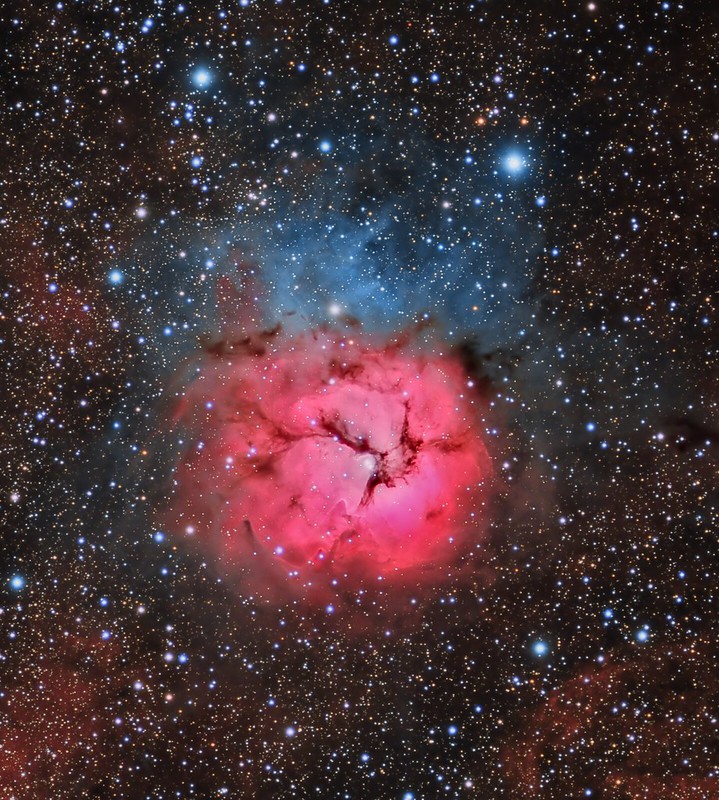 Trífida Close
Trífida Close by
maicon germiniani, no Flickr[/img3]
Re: Submissions: 2019 September
Posted: Tue Sep 10, 2019 6:35 pm
by sixburg
NGC 6188 SHO
Deep Sky West - South (El Sauce)
TOA-150
AP1600GTOAE
FLI ML16200
August 2019
Ha 8nm: 36x1800" bin 1x1
Oiii 8nm: 19x1800" bin 1x1
Sii 8nm: 22x1800" bin 1x1
Integration: 38.5 hours
Re: Submissions: 2019 September
Posted: Tue Sep 10, 2019 11:29 pm
by rechejaro
Ann wrote: ↑Tue Sep 10, 2019 12:46 am
rechejaro wrote: ↑Mon Sep 09, 2019 10:35 pm
Reflection Nebula in the Earth's atmosphere
What does this image suggest to me?
Why can we detect reflection nebulas surrounding stars like the pleiades? This storm in the Sierra Nevada mountains, southern Spain, is in my opinion a good analogy to understand the process.The clouds of this storm do not emit light by themselves and they remain dark most of the time. But when a large amount of light is generated inside it, suddenly the entire structure of the water vapour in the atmosphere becomes visible. A clear difference from this analogy is that the light of the stars are much more constant and lasting in time than the instant light of a lightning strike.
Technical data:
Sony A7s with 85mm f1.2 samyang XP series. Stacking of 8 images. 25 seconds, f11, ISO400.
Image Credit & Copyright: Antonio Román Reche (Sociedad Astronómica Granadina, SAG) Acknowledgment to VeraGAZ Team (G. Román; S. Alonso).
Very beautiful. Fantastic lightning display. I suppose that the blue color seen in the clouds was real, or at least it was what your photographic equipment detected?
Ann
Thank you so much. You are correct Ann. The raw shots have a color very similar to the final result. In edition I streched a little bit the histogram, a bit of curves, crop and noise reduction.
Antonio
Re: Submissions: 2019 September
Posted: Wed Sep 11, 2019 3:31 am
by sydney
Ring Nebula
[Ha][OIII][RGB]
Nick Pavelchak
http://www.astrobin.com/abz2e6/
Re: Submissions: 2019 September
Posted: Thu Sep 12, 2019 6:41 am
by Lorenzo Comolli
Re: Submissions: 2019 September
Posted: Thu Sep 12, 2019 10:57 am
by G.Chatzifrantzis
M27 Dumbbell Nebula
Equipment :
OTA : Meade 14 SCT
Mount : Skywatcher EQ8
Camera : Atik 460 ex & exc
Filters : Astronomik Oiii 6nm & CLS,Baader Ha
Guiding : OAG via Lodestar X2
Software : Dss - Pix - Ps
Exposure :
Ha : 13h45min
Oiii : 9h
RGB : 4h
Location '; Thessaloniki Greece
Re: Submissions: 2019 September
Posted: Thu Sep 12, 2019 5:09 pm
by alexandre cucculelli
https://zupimages.net/up/19/37/loji.jpg
Telescope: Newton 254 f / 4.7
Mount: AP 1200 GTO
Autoguiding: Atik GP
Exposure time: Ha (16 x 1200 s bin 1X1) and OIII (10 x 600 bin 2x2) - RGB (8x 300 bin 2x2).
Automatically controlled under PRISM V10, pretreatment under PRISM V10
this is my new version with the Cannistra method works.
alex.
Re: Submissions: 2019 September
Posted: Thu Sep 12, 2019 9:11 pm
by jimstar
Subject: Cygnus Wall
Copyrights: James Collins
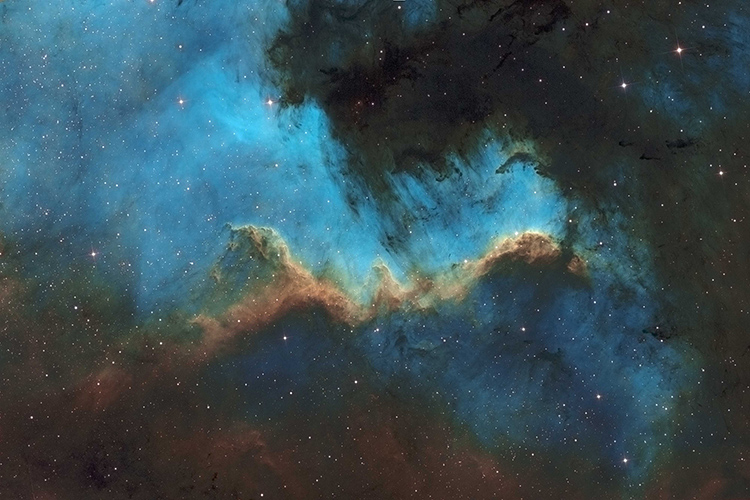
Larger image URL:
http://jimstar11.com/Cygnus-Wall-4.jpg
Web Site: Meadow View Observatory
http://jimstar11.com/
Re: Submissions: 2019 September
Posted: Thu Sep 12, 2019 10:43 pm
by Jean-Baptiste Auroux
A 78h collaborative image of NGC 7000 !
Full version :
https://cdn.astrobin.com/thumbs/DqQvW1d ... hqkGbg.jpg
"Astropotes" (which means "astro-buddies" in French) is a collaborative astrophoto group created in June 2019.
The principle is simple: each membre can share its own raw files on the same objects, chosen by the majority of the members, in order to cumulate long exposure time and to produce deeper collaborative images.
We chose to start our collaboration with an image of a nebula and an image of a galaxy, in order to define the potential of our pre-processing and processing workflow on these two types of objects.
We are pleased to present you our first achievement on a classical object :NGC 7000, with a global integration time of 77h40 !
Raw files : Frédéric Girard, Nicolas Kizillian, Valentin Cohas, Baptiste Zloch, K-mille Colomb, Jean Baptiste Auroux & Thomas Lelu.
SII : 17h45, Ha : 36h30, OIII : 19h, R : 1h40, V : 1h40, B : 1h05.
Preprocessing : Matthieu Tequi & Mathieu Guinot
Processing : Jean-Baptiste Auroux
Copyright: Astropotes
https://www.astrobin.com/users/AstroPotes/
